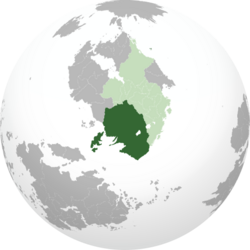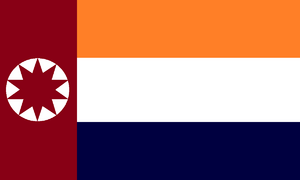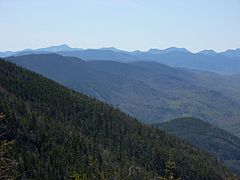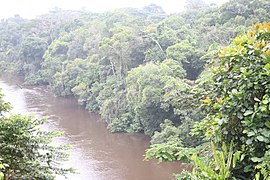Puertego
Puertego ("The People's Republic of Puertego") La República Popular de Puertego (Spanish) | |
|---|---|
|
Flag | |
Motto: "Hacia adelante y hacia adelante para siempre" ("Foreward and onward forever") | |
Anthem: Your song | |
 Location of XXX (dark green) In XXX (gray) | |
| Capital | San Lina |
| Largest city | Capital |
| Official languages | Spanish, English |
| Religion | Puertegan Unified Church |
| Demonym(s) | Puertegan (noun) XXXan (adjective) |
| Government | Unitary Marxist-Leninist Dominant Party Presidential Republic |
• President | Matthias Torres |
| Legislature | National Assembly |
| Establishment | |
• Independance | January 18th, 1904 |
| Population | |
• Estimate | 65 million |
| GDP (nominal) | estimate |
• Total | $322.418 billion |
• Per capita | $4,960 |
| HDI | 0.625 medium |
| Currency | Damillo ((DMO)) |
| Driving side | right |
The People's Republic of Puertego commonly called Puertego, is a Unitary Marxist-Leninist Presidential Republic currently under the rule of President Matthias Torres the leader since 2001 though since the enacting of various capitalist policies the legitimacy of them calling themselves Marxist-Leninist has been questioned. It is bordered on the north by Pelaxia and Volonia and on the west by the Natiserve Bay. Puertego covers 1,185,182 square kilometers and has an estimated population of 65 million. Puertego comprises of 12 states and 1 territory.
Puertego was first a collection of tribes that inhabited its modern-day borders and the land around it until the first empire of the region came to be. Puertego was originally colonized by the Spanish in the mid 1500's under the name of Puerto Negro because of the large number of slaves moving through and that were in the colony, things got better slowly with the numbers of slaves slowly decreasing until the outlawing of slavery in 1811 where all of them were freed. However, Puertego was still largely impoverished and ruled over my oppressive colonial overlords who brutally repressed the people when they demanded change and treated their newly freed workers almost the same as they did when they were slaves causing multiple large-scale revolts until the country finally gained its independence in a war against Spain in 1904 with one of the last things the Spanish did when they still had control was build a canal which has been a vital part of Puertego's economy ever since. After independence the country fell into the sphere of influence of the Americans who installed multiple puppet dictators to run the country as a banana republic with conditions barely improving for the workers, corruption running rampant, and any industry that wasn't mining or agriculture going bankrupt. The country stayed like this until the end of WW2 where multiple protests and revolts finally got the government to begin transitioning to democracy, however both the Soviets and the Americans almost immediately began to meddle in the country's elections with the Puertegan Conservative Party and the Puertegan Labor Party cyclically taking power and cracking down on the other when they gained power until 1972 when the American government authorized a military coup where a fascist dictator took power, banning political parties until he was overthrown by a communist revolution in 1980 with the country being ruled as a one party state until 1992 where a civil war between the hardline Communist Red Flag party and the reformist Communist White Flag Party broke out ending in 1997 when the Communist White Flag party won and assumed control of the government. The Communist White Flag party is still the incumbent party in the nation's government and them having lost either their majority in parliament or a presidential election for one of their candidates, President Matthias Torres has served as the President of Puertego for 22 years as a member of the party and has taken large measures to liberalize the country's economy preventing stagnation.
Puertego is a regional and middle power in international politics. Puertego is considered a developing, lower-middle income, and newly industrialized country, a large portion of their economy is made by natural resources and industry. The government of Puertego is considered a hybrid regime which maintains elections that are regular and free though not fair while also having strong authoritarian powers such as the ability to crack down on freedoms such as speech, assembly, association, and the press with the country constantly being ranked one of the most dangerous places in the world for journalists having at least 400 actively serving prison time for defamation charges pressed on them by the government and having an extremely poor record with human rights including torture, arbitrary arrests, extrajudicial executions, and unfair trials among many others along with massive levels of corruption and censorship. The country tries to maintain a neutral policy in foreign affairs to try and keep trade good with all countries.
Puertego is a member of the League of Nations.
Etymology
Why is your country called what it is? What is the source of that word or phrase?
History
What is a general overview of your country's path through history?
First era
How was your country originally settled?
Second era
What were the first political structures of your country? Did it have any very early rivals or was it controlled by a foreign country?
Third era
What were your country's first major moves on an international level?
Fourth era
Did your country ever have a period of significant decline or internal struggle?
Fifth era
Was your country subject to imperialism later in its life, or was it an imperial power?
Sixth era
How did the 20th century affect your country?
Geography
-
First lovely location
-
Second lovely location
-
Third lovely location
-
Fourth lovely location
-
Fifth lovely location
-
Sixth lovely location
What is the general explanation of how your country exists within the world?
Climate and environment
Is your country hot or cold?
Government and Politics
How is your country ruled or governed?
Executive
Who is responsible for making high level choices in your country? Does it have a President or King?
Legislative
Who decides the laws for your country? Is there political parties and a legislature?
Federal subdivisions
How is your country divided? Are there states or provinces, or is the country directly governed from the capital as a unitary state?
Politics
What political factions exist? Who has ruled predominantly?
Law
What kind of laws and legal system does your country employ?
Demographics
What kind of people live in your country?
Ethnicity
What ethnic groups make up your country?
Language
What language or languages do your country's people use? Are there any previously used languages no longer common? Are these languages native to your country or shared with another?
Religion
Religious affiliations in the XXX (20XX)
What do your country's people believe in religiously, if anything? How many groups are there?
Education
How many people in your country are educated?
Culture and Society
What do your people do, and what are they like?
Education
What is your country's education system like? How do the schools work? What do people think about education?
Attitudes and worldview
How do your country's people view life?
Kinship and family
How are families or kinship groups structured in your country?
Cuisine
What do your people eat?
Religion
What do your people believe? Rather than demographics, as above, think about how important religion is to your people and their view about their own and other religions. What is the relationship between the prevailing view and minority religious groups? Is it an official religion, and do any laws exist about free worship?
Arts and Literature
What type of art do your people make? Do they have a tradition of painted art, well-crafted television shows, or great music?
Sports
Does your country have any major sports leagues? What types of sports are played, both professionally and for fun by your country's people?"
Symbols
Are there any prominent symbols which are well known to represent your country?
Economy and Infrastructure
How does your country's economy work?
Industries and Sectors
What are the largest parts of your economy in terms of what they do?
Currency
What exchange systems are used within your country's economy?
Healthcare
How do people in your country procure medical care? How is it paid for?
Labor
How is labor organized within your country? Are there any social institutions or unions which deal with labor concerns?
Transportation
How do people in your country get around? Is there a major highway system as well as sea- and airports?
Energy
What type of energy keeps your nation going? Are you renewable or use fossil fuels, and if you are renewable, how recently did your country transition?
Technology
How advanced is your country? Is it an innovator, or does it largely import new developments?
Military
How large is your country's military? Is it large but poorly equipped or small and elite? Does your country have a martial tradition?






